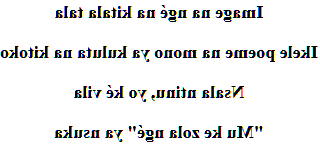Kongo love poem
Kitala tala
Image na ngé na kitala tala
Ikele poeme na mono ya kuluta na kitoko
Nsala ntinu, yo ké vila
"Mu ke zola ngé" ya nsuka


→ French poem ←
Kongo language
Kongo (congo, koongo, kikoongo, kikongo), a translation which come from the Democratic Republic of Congo. There are about 10 million people who will understand this love poem mainly in the Bas-Congo provinces. Note that the words "image" and "poem" are similar in French, but we could use "nkunga" in place of "poem".
The written traces in Kikongo are among the oldest. L. Homburger quotes the translation into Kikongo of a treatise about Christian doctrine (Lisbon 1624). Fr. Hyacinthe Brusciotto de Vetralla (Rome 1650) publishes a Kikongo-Portuguese-Latin-Italian vocabulary.
Let us mention a few dialects of Kikongo which are spoken in the region of the former Kongo kingdom: Kimanyanga, Kintandu, Kiyombe, Kifioti and Kiladi.
The Kongos
The Kongos or Bakongos are Bantu established on either side of the Congo River, the slavery period has caused their population to fall. For a bit of history: In the 15th century, the son of the chief of the small state of Bungu near Boma settled with his family on the Kongo plateau and subjected the local populations, Ambundus (Ambuelas). The first king marry in the clan of earth chiefs and is crowned mani Kongo. This royalty of divine right will be the keystone of the whole system. The kingdom extends from the ocean to the Kwango valley, and from the valleys of Congo and Nsele to that of Loje.
At the end of the 15th century the Portuguese make contact with the king, missionaries and merchants settle, the latter notably for the slave trade, against which the king tries in vain to struggle. Baptized, his younger son, enthroned king, reigns until 1543. He strengthens the central power and tries to evolve his country by the contact with the West. His successor is overthrown by an usurper who will see relations with the Portuguese, tense. In 1568, in front of the massive invasion of the Jagas, the king asks Portugal for help. This will be the beginning of the decadence and the beginning of a new young kingdom, that of Angola.